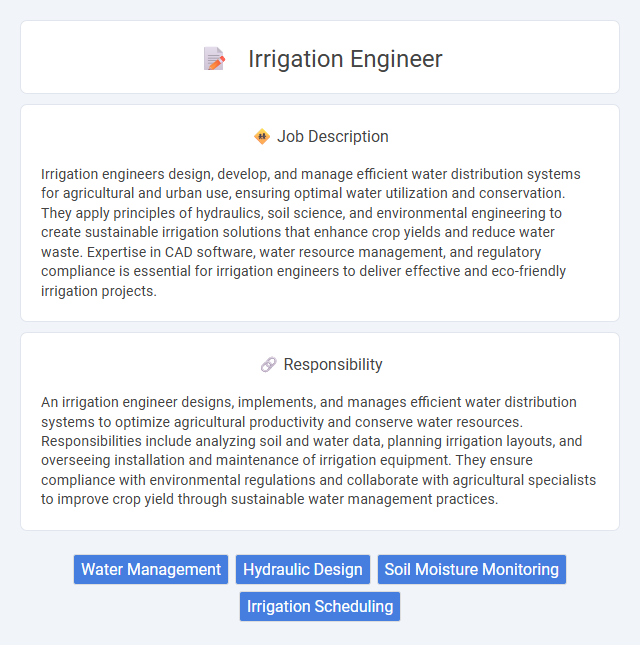
Irrigation engineers design, develop, and manage efficient water distribution systems for agricultural and urban use, ensuring optimal water utilization and conservation. They apply principles of hydraulics, soil science, and environmental engineering to create sustainable irrigation solutions that enhance crop yields and reduce water waste. Expertise in CAD software, water resource management, and regulatory compliance is essential for irrigation engineers to deliver effective and eco-friendly irrigation projects.
Individuals with a strong background in hydraulic systems and environmental science are likely to be well-suited for an irrigation engineer role, as the job demands technical expertise and problem-solving skills. Candidates who enjoy working outdoors and addressing water management challenges have a higher probability of thriving in this position. Those lacking interest in engineering concepts or unwilling to adapt to evolving agricultural technologies may find the job less suitable for their strengths and preferences.
Qualification
Irrigation engineers typically require a bachelor's degree in agricultural engineering, civil engineering, or a related field emphasizing water resource management. Advanced certifications or a master's degree in irrigation technology or hydrology can enhance job prospects and expertise. Proficiency in designing irrigation systems, hydraulic modeling, and knowledge of soil-water-plant relationships is essential for effective project implementation.
Responsibility
An irrigation engineer designs, implements, and manages efficient water distribution systems to optimize agricultural productivity and conserve water resources. Responsibilities include analyzing soil and water data, planning irrigation layouts, and overseeing installation and maintenance of irrigation equipment. They ensure compliance with environmental regulations and collaborate with agricultural specialists to improve crop yield through sustainable water management practices.
Benefit
Irrigation engineers likely experience benefits such as contributing to sustainable water management and improving agricultural productivity. They probably enjoy job stability due to the ongoing need for efficient irrigation systems amid environmental challenges. Opportunities for professional growth and involvement in innovative water conservation technologies may also be prevalent in this field.
Challenge
Irrigation engineers likely face the challenge of designing systems that efficiently manage water resources in regions with unpredictable rainfall patterns. Ensuring sustainable water distribution while adapting to climate change impacts may require innovative solutions under resource constraints. The complexity of integrating modern technology with existing infrastructure might also present ongoing difficulties.
Career Advancement
Irrigation engineers design and manage efficient water distribution systems for agricultural and landscaping projects, ensuring optimal water use. Career advancement opportunities include roles such as senior engineer, project manager, or water resource specialist, often requiring additional certifications or a master's degree in civil or environmental engineering. Expertise in cutting-edge technologies like GIS, remote sensing, and sustainable irrigation techniques significantly enhances promotion prospects within government agencies, environmental firms, and private sector companies.
Key Terms
Water Management
Irrigation engineers specialize in designing and implementing efficient water management systems for agriculture, ensuring optimal water distribution to maximize crop yield while conserving resources. They utilize advanced technologies such as drip irrigation, sprinkler systems, and soil moisture sensors to reduce water wastage and improve sustainability. Expertise in hydrology, soil science, and environmental regulations is essential for developing innovative solutions that address water scarcity and promote sustainable agricultural practices.
Hydraulic Design
Irrigation engineers specializing in hydraulic design develop efficient water distribution systems to maximize agricultural productivity and conserve resources. They analyze fluid dynamics and soil-water interactions to create canals, pipelines, and drainage solutions tailored to specific terrains and crop requirements. Expertise in hydraulic modeling software and sustainable water management practices is essential for optimizing irrigation infrastructure performance and minimizing environmental impact.
Soil Moisture Monitoring
Irrigation engineers specializing in soil moisture monitoring apply advanced sensors and data analytics to optimize water usage in agricultural fields, ensuring precise moisture levels for crop health. They utilize technologies such as tensiometers, capacitance sensors, and remote sensing to provide real-time soil moisture data, enabling efficient irrigation scheduling. This role significantly contributes to sustainable water management and enhances crop yield by preventing over-irrigation and water stress.
Irrigation Scheduling
Irrigation engineers specializing in irrigation scheduling develop precise water application plans to optimize crop growth and conserve water resources. They utilize advanced software tools, soil moisture sensors, and climate data to determine the optimal irrigation timing and quantities, ensuring efficient water use and reduced runoff. Expertise in hydraulic systems, crop water requirements, and sustainable water management practices is essential for maximizing agricultural productivity while minimizing environmental impact.
 kuljobs.com
kuljobs.com